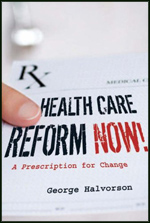
The Energy and Commerce Committee's health subcommittee in the U.S. House of Representatives is examining the state of federal health care programs, including Medicaid, which have suffered due to budget shortfalls at the state level. These budget shortfalls are caused by the current downward spiral in the financial sector.
This examination comes on the heels of nationwide cries for assistance from governors across America. As belts tighten everywhere, the impact is felt in our already ailing health care system.
From the Associated Press via Forbes:
It's a good thing that there are several plans being developed to reboot the system in Congress right now. With a reform-minded President on his way in, one who has already stated that health care is a top priority, the time is right. Besides, as I have commented in the past, fixing some of the cost issues currently burdening the system will have significant impact on the overall economy.While health care is typically seen as the one part of the economy least affected by downturns, recent reports show the financial meltdown already is affecting health care decisions.
Almost one third of patients surveyed by Kaiser Family Foundation last month said they had skipped medical treatment, up from 24 percent in April. Drugmakers like Pfizer Inc. (nyse: PFE - news - people ) also have reported fewer prescriptions are being filled compared with this time last year.
Remember, health care accounts for a lot of US spending....
SOURCE: "Ahead of the Bell: Health care hearing" 11/13/08
photo courtesy of Janie-Jan, used under its Creative Commons license










